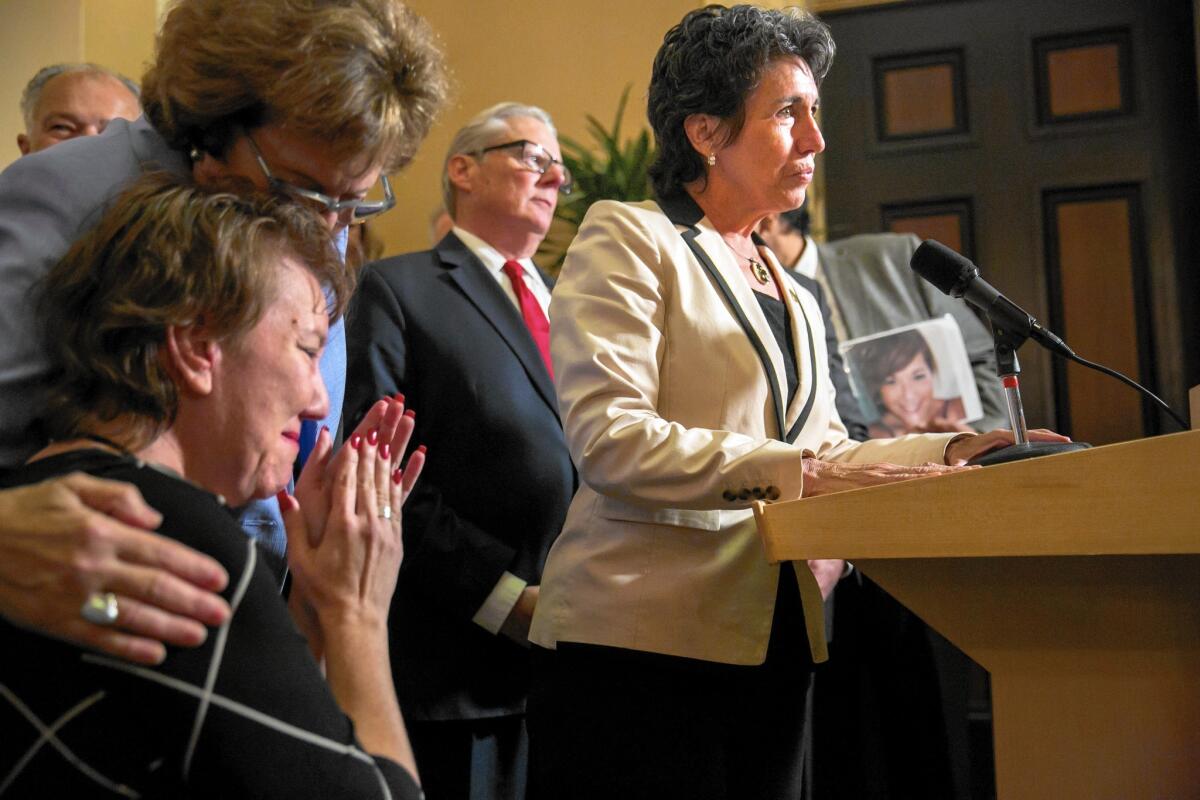The woman behind California’s end-of-life law

For decades, Susan Talamantes Eggman’s life has revolved around death.
As a hospice social worker, she sat by the bedsides of hundreds of terminally ill patients. As a doctoral candidate, she researched the end-of-life experiences of Latino families in the Central Valley.
Now, as a state Assembly member, she is the lead author of the law signed by Gov. Jerry Brown on Monday allowing terminally ill patients to legally obtain lethal doses of prescription drugs to end their lives.
The legislation sparked several emotionally raw debates in the Capitol, prompting lawmakers and advocates on both sides of the controversial issue to share anguishing personal stories and wrestle with vexing moral questions.
It’s a debate likely to continue: Opponents, hoping to overturn the measure, filed papers Tuesday to put a referendum on the law before voters in November 2016.
The subject of death is less fraught for Eggman, a Democrat from Stockton and a practicing Catholic, than it might be for politicians with fewer up-close brushes with mortality.
“Everyone is going to die. [The question is] how and the life that you live going up to it,” she said. “Sitting by people who are dying every day, you learn so much about living.”
Born in Castro Valley, south of Oakland, Eggman was the daughter of an Oklahoma-born father and a Mexican American mother. The family later moved to a farm in Turlock, where they tended almond trees and bottled honey from beehives.
A middling high school student, Eggman enlisted in the Army at 18 as a combat medic, serving four years at the Fort Meade Army hospital in Maryland. There she met Renee Hall, who became her longtime partner and, as of June 2014, her wife.
Together they moved back to California, where Eggman continued to work in healthcare. Her pivot toward hospice care came after she watched her godmother — her mother’s best friend — die from cancer.
Working with terminal patients became Eggman’s passion and, perhaps paradoxically, a happy vocation.
“In end-of-life work, there’s a lot of joy,” she said. “People are still living. We want to help you live every day until the end.”
That attitude is not shared by many in what Eggman calls our “death-denying culture.”
As she entered academia — completing a doctorate in social work at Portland State University just as Oregon’s assisted-death law was going into effect and then teaching at CSU Sacramento — she noticed how much people avoided talking about the end.
“People think they’re immortal,” she said. “It frightens them to think of their own death.”
Eggman’s crossover into politics was inspired by the morose reaction of her faculty colleagues to the reelection of President George W. Bush in 2004. A lifelong Democrat, Eggman vowed to run for the next elective office that opened up.
That office was on the City Council in Stockton, where Eggman and Hall had settled as a halfway point between her teaching job in Sacramento and her ailing mother in Turlock. Eggman served six years on the council, during which the city, ravaged by the recession, declared bankruptcy.
The former social worker found herself voting to close libraries and rein in employee benefits, decisions she called “horrifying.”
She easily won her first Assembly race in 2012. She helped craft a $7.5-billion water bond, concentrating on the ecological sensitivities of her region, which serves as the state’s water hub.
Assembly Speaker Toni Atkins (D-San Diego), who put Eggman on her leadership team, noted her maturity in dealing with colleagues.
“She’s pretty straightforward and pretty direct when dealing with an issue,” Atkins said, “but she also knows when to back off.”
That balance proved essential on proposals related to death.
In 2014, Eggman proposed requiring doctors to inform terminally ill patients of their right to learn about end-of-life care options. Some fellow Assembly members balked. The bill passed narrowly and was signed into law, but its rocky path made her doubt the Assembly was ready to take on assisted death.
But Sen. Bill Monning (D-Carmel) and Sen. Lois Wolk (D-Davis), who had long considered taking on the issue, felt the time was ripe. Brittany Maynard, a 29-year-old Californian with terminal brain cancer, had publicized her move to Oregon to take advantage of that state’s aid-in-dying law, renewing California’s debate about its own laws.
The senators, working with Eggman, introduced a measure in January. It passed the Senate but stalled in the Assembly.
During the special legislative session the governor called on healthcare, the trio tried again, starting in the Assembly with a new version of the bill by Eggman. She soon became the Legislature’s public face of the highly contentious proposal.
The bishop of the Diocese of Stockton, with whom she had met about the measure, published a letter to Eggman in the local newspaper opposing her legislation.
“Susan, you have spoken to me about the right to choose to die on one’s own terms as an exercise of autonomy,” wrote Bishop Stephen Blaire, adding, “We may be ready to die and even want to die, but the final decision is in the hands of God.”
The Assembly debate showed how wrenching the decision was for lawmakers, many of whom told personal stories of loss and faith.
Eggman, presenting the bill, closed on a personal note of her own. She rattled off the list of family members she had watched die, ending with her father, a bourbon lover whom her siblings toasted with Wild Turkey after he died.
“That speech on the floor — you could feel it in the room, it really changed the dynamic,” Wolk said.
That day, after the measure passed, Eggman returned to her office and toasted the victory with Wild Turkey.
Twitter: @melmason
MORE COVERAGE ON THE ASSISTED SUICIDE BILL
After struggling, Jerry Brown makes assisted suicide legal in California
How assisted suicide will work in California
Jerry Brown turned to his own doctor and Desmond Tutu in assisted-suicide decision
More to Read
Sign up for Essential California
The most important California stories and recommendations in your inbox every morning.
You may occasionally receive promotional content from the Los Angeles Times.











